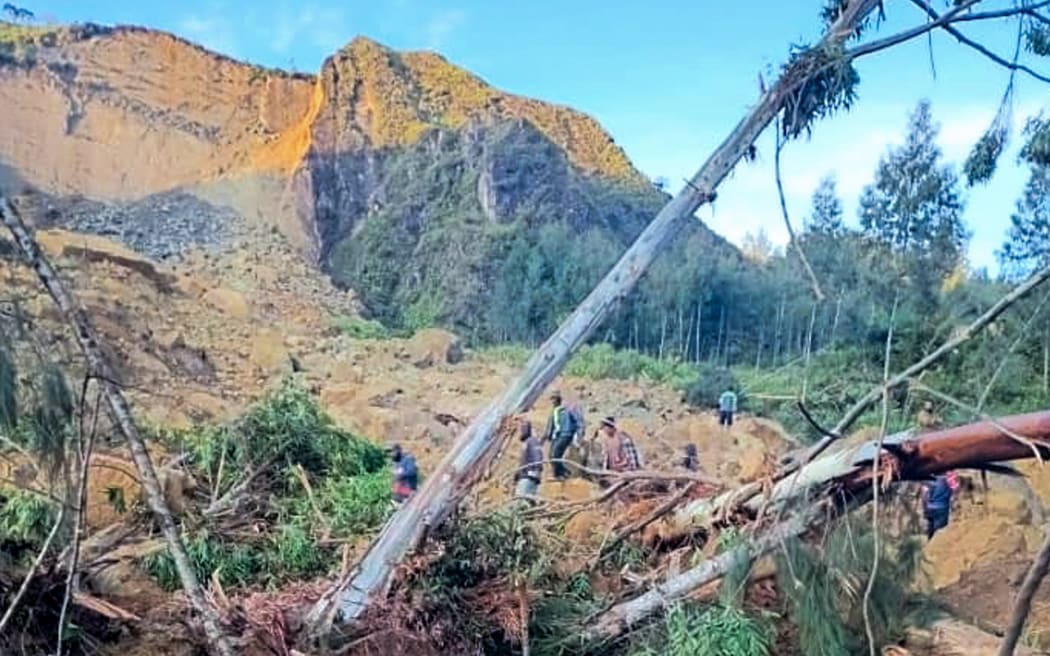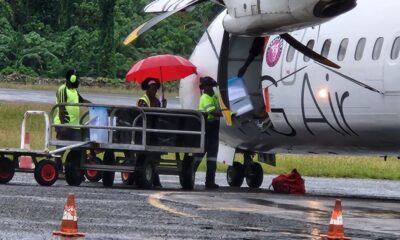World
Landslide in Papua New Guinea Claims 22 Lives, Recovery Efforts Ongoing

A devastating landslide in the small village of Kukas, located in Enga Province of Papua New Guinea, has resulted in a rising death toll now confirmed at 22. The disaster struck over a week ago, burying families under the earth and leaving entire communities in mourning. Rescue workers remain engaged in recovery efforts, hoping to locate additional victims still trapped.
The spokesperson for the Wabag MP office, Geno Muspak, shared the profound impact this tragedy has had on the local populace. “Some families, they lost most of their family members, leaving no one behind,” Muspak stated in an interview with RNZ Pacific. The loss is particularly acute in a culture that places significant value on family ties and community connections.
Community Grief and Safety Concerns
The scale of loss has left a deep scar on the community. Muspak emphasized the emotional toll, saying, “It’s a great loss for the families, the community, the relatives. And it’s a really sad moment and sad story for those people who lost their family members, especially the immediate family.”
In addition to the immediate tragedy, there are growing concerns for the safety of approximately 300 residents living in close proximity to the landslide site. Muspak noted that disaster response teams are working tirelessly to assess the situation and relocate those at risk. “The disaster team is now working around the clock to see if they can relocate those people that are currently living along the same area,” he explained.
Impact of Climate Change
The frequency and severity of such landslides are being linked to changing weather patterns attributed to climate change. Muspak indicated that many elders in the area have no recollection of similar disasters occurring in previous generations. “At this point in time, where there’s a lot of climate change, and the weather pattern is not like what we’ve been experiencing in the past, say, five to ten years,” he said.
He further elaborated on the need for communities to seek safer living conditions. “People wanted to move and find refuge in areas where it was safe to live, with flooding also an issue in parts,” Muspak added. The urgency to relocate is heightened by the dangers posed by living near rivers and mountains, which are increasingly susceptible to extreme weather events.
As recovery efforts continue, the situation remains fluid, with the potential for the death toll to rise. Local authorities and disaster relief teams are working diligently to provide support to affected families and ensure the safety of those still at risk. The tragedy has not only highlighted the immediate need for assistance but has also raised broader questions about the impact of climate change on vulnerable communities in Papua New Guinea and beyond.
-

 Sports2 months ago
Sports2 months agoNetball New Zealand Stands Down Dame Noeline Taurua for Series
-

 Entertainment2 months ago
Entertainment2 months agoTributes Pour In for Lachlan Rofe, Reality Star, Dead at 47
-

 Entertainment4 weeks ago
Entertainment4 weeks agoNew ‘Maverick’ Chaser Joins Beat the Chasers Season Finale
-

 Sports5 days ago
Sports5 days agoEli Katoa Rushed to Hospital After Sideline Incident During Match
-

 Sports2 months ago
Sports2 months agoSilver Ferns Legend Laura Langman Criticizes Team’s Attitude
-

 Politics1 month ago
Politics1 month agoNetball NZ Calls for Respect Amid Dame Taurua’s Standoff
-

 Entertainment2 months ago
Entertainment2 months agoKhloe Kardashian Embraces Innovative Stem Cell Therapy in Mexico
-

 World3 months ago
World3 months agoPolice Arrest Multiple Individuals During Funeral for Zain Taikato-Fox
-

 Sports3 months ago
Sports3 months agoGaël Monfils Set to Defend ASB Classic Title in January 2026
-

 Sports3 days ago
Sports3 days agoJamie Melham Triumphs Over Husband Ben in Melbourne Cup Victory
-

 Entertainment1 month ago
Entertainment1 month agoTyson Fury’s Daughter Venezuela Gets Engaged at Birthday Bash
-

 Sports1 month ago
Sports1 month agoHeather McMahan Steps Down as Ryder Cup Host After Controversy





















